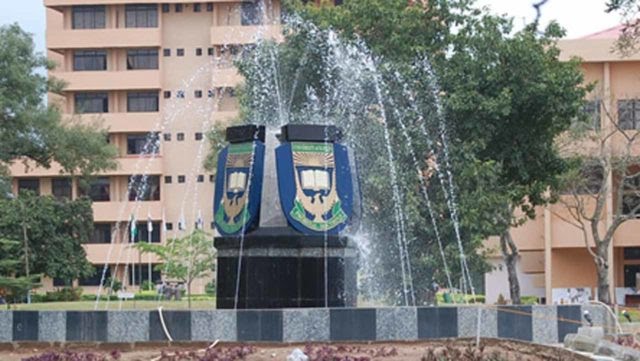Education
OOU VC cautions varsities against indiscriminate award of first-class degree
Vice Chancellor, Olabisi Onabanjo University, Ago Iwoye, Prof. Ganiyu Olatunde, has advised universities in the country against indiscriminate award of first-class degree to their students, saying a situation where some universities would have a significant number of their graduating students bagging such is becoming worrisome.
He however clarified that students deserving of such grades should not be denied.
He spoke in Ago Iwoye while briefing journalits on activities lined up for the 30th convocation ceremony of the institution.
According to him, graduates should be able to defend the certificates and degrees held by them.
“A situation where you have a university graduating a few hundred students and among them, over one hundred bag first-class degrees leaves room for probing questions. No one is saying that students who deserve first-class degrees should not be given. Hard work, dedication and commitment should be rewarded.
“However, the manner some universities go about placing students in that category should be checked. We are graduating 6,257 and only 55 are in the first class category. We are very sure of our products and they can defend whatever certificate and degree they possess,” he stated.
Giving a breakdown of the graduating students who are from the 2019/2020 and 2020/2021 sessions, Olatunde said 991 are in the second class upper category, 2,738 in the second class lower level, 1,925 in the third class category, 217, pass category and 135 in the unclassified category.
He added that 140 would bag postgraduate diploma, 486 master’s degree and 103 to get doctorate degree.
As part of the activities to mark the occasion, the Registrar of the Joint Admissions and Matriculation Board, JAMB, Prof. Is-haq Olanrewaju Oloyede would deliver the convocation lecture titled “Your future is in your hands”, while a convocation play written by Prof. Femi Osofosan would also be staged
Listing some of his achievements since he came on board about five years ago, Olatunde said massive infrastructural development had taken place, while staff and students welfare was given a boost.
He also noted that research was not neglected, and cited the anti-COVID syrup developed in the university
“The syrup has been found to be very effective and we took it to the National Agency for Foods and Drugs Administration and Control, NAFDAC, for the necessary scrutiny. Operational issues are the factors delaying final decision on it,” he said.
The VC also debunked the insinuation that the university was involved in illegal admissions
He said, “I have been to JAMB office in Abuja and what happened was that some processes were not completed and we have done that.
“We have always abided by the rules and regulations guiding admission procedures in our university.”
Education
BREAKING: Academic Activities Halted as ASUU Resumes Strike

BREAKING: Academic Activities Halted as ASUU Resumes Strike
The Academic Staff Union of Universities (ASUU), Taraba State University (TSU) branch, has resumed an indefinite strike, citing the failure of the Taraba State Government to honour agreements reached earlier with the union.
The industrial action comes weeks after ASUU suspended its earlier strike following negotiations held on January 17, 2025, a move the union said was done in good faith to allow the government time to meet its commitments. According to ASUU, those promises were not fulfilled, forcing lecturers to withdraw their services again.
In a statement issued in Jalingo, the ASUU TSU branch chairman, Joshua Garba Mbave, said the government failed to take practical and verifiable steps toward resolving the lingering issues affecting staff welfare.
READ ALSO:
- Ramadan Health Tips: Six Ways to Stay Hydrated While Fasting
- Tinubu Urges Senate to Confirm Yusuf for NAHCON, Marafa for INEC
- Galatasaray Stun Juventus 5–2 in UEFA Champions League
The union said its congress meeting held on February 18, 2026, reviewed developments since the suspension of the strike and unanimously agreed to resume the total, comprehensive, and indefinite strike.
ASUU listed several unresolved demands, including unpaid salary arrears, non-payment of Earned Academic Allowances, the absence of a functional pension scheme for university workers, and the failure to implement the 2025 ASUU–Federal Government agreement applicable to state-owned universities.
Dr. Mbave warned that the continued neglect of these issues has crippled staff morale, worsened economic hardship for lecturers, and disrupted academic stability at Taraba State University. He stressed that sustained dialogue with the Taraba State Government had produced no concrete outcome.
As a result of the renewed strike, academic activities at Taraba State University have been suspended indefinitely, with students advised to remain at home until further notice.
BREAKING: Academic Activities Halted as ASUU Resumes Strike
Education
Check Your Name: UNILORIN Releases Updated NELFUND Refund List for 2024/2025 Students

Check Your Name: UNILORIN Releases Updated NELFUND Refund List for 2024/2025 Students
The University of Ilorin (UNILORIN) has released a new list of students eligible to apply for the 2024/2025 NELFUND refund, according to the UNILORIN Students’ Union (SU). Students who paid school fees before NELFUND disbursed funds directly to the university are now required to check their names and submit refund requests through the proper channels.
The official refund eligibility list has been shared in an Excel spreadsheet format and contains verified student details, including full name, matriculation number, department, and eligibility status. Students can search the file using their name or matric number to confirm their eligibility.
Those whose names appear on the list are instructed to fill the official refund form and submit supporting documents, including fee receipts and bank account details, to the Student Affairs Unit (SAU) or their respective Dean’s Office. The refund disbursement is gradual and ongoing, depending on NELFUND fund release schedules.
READ ALSO:
- Argungu Festival 2026 Highlights Peace, Stability, Economic Growth — Tinubu
- US Military Boosts Support for Nigeria’s Fight Against Insurgency With Ammunition, Troop
- Afenifere Calls for Immediate Take-Off of State Police as Terror Threats Rise in Yorubaland
For students whose names are not on the current list, they are advised to check their NELFUND portal status at portal.nelf.gov.ng and ensure all records are correctly verified. UNILORIN and the Students’ Union have also clarified that this is not the final list, as additional batches of eligible students may be added as verification continues.
Students are urged to act promptly, as following the prescribed procedures will ensure timely refund of fees paid in advance.
How to Check Your Eligibility
Students can confirm their eligibility by viewing the official list published by the university. To streamline verification, a table of students in the Department of Accounting and select departments is presented below.
| S/N | Matric Number | Student Name | Programme | Level | Department |
|---|---|---|---|---|---|
| 1 | 20/66MA093 | Johnson Babatunde Ogunwunmiju | B.Sc. Accounting | 400 | Accounting |
| 2 | 21/66MA002 | Zainab Oreoluwa Abdulrahmon | B.Sc. Accounting | 400 | Accounting |
| 3 | 21/66MA021 | Shukurat Oluwapelumi Adetunji | B.Sc. Accounting | 400 | Accounting |
| 4 | 21/66MA038 | Josephine Oluwateniola Akoki | B.Sc. Accounting | 400 | Accounting |
| 5 | 21/66MA049 | Vivian Member Aun | B.Sc. Accounting | 400 | Accounting |
| 6 | 21/66MA054 | Yusuf Olamilekan Babatunde | B.Sc. Accounting | 400 | Accounting |
| 7 | 21/66MA065 | Precious John Elijah | B.Sc. Accounting | 400 | Accounting |
| 8 | 21/66MA083 | Mariam Omowunmi Issa | B.Sc. Accounting | 400 | Accounting |
| 9 | 21/66MA088 | Toyosi Kolade | B.Sc. Accounting | 400 | Accounting |
| 10 | 21/66MA091 | Ayanfe Olaoluwa Makanjuola | B.Sc. Accounting | 400 | Accounting |
Note: The above table shows a partial list for illustration. The full list includes hundreds of students across various faculties and levels.
UNILORIN NELFUND Refund List 2025/2026
Check Your Name: UNILORIN Releases Updated NELFUND Refund List for 2024/2025 Students
Education
NELFUND Refutes UniAbuja Loan Diversion Claims

NELFUND Refutes UniAbuja Loan Diversion Claims
The Nigerian Education Loan Fund (NELFUND) has strongly refuted recent claims that officials of the University of Abuja (UniAbuja), including the vice‑chancellor and senior administrators, diverted or misappropriated student loan funds intended for indigent students.
In a detailed statement, NELFUND clarified that no verified evidence exists to support allegations that UniAbuja unlawfully withheld or diverted loan disbursements. The Fund said the speculation circulating in some media reports — which implicated the university’s vice‑chancellor, the Dean of Students’ Affairs, and other officials in the alleged diversion of multibillion‑naira funds — is unfounded and misleading.
The reports also suggested that UniAbuja failed to reimburse residual balances to students whose actual tuition fees were lower than the amounts disbursed by NELFUND on their behalf. In response, NELFUND maintained that its structured disbursement and reconciliation framework ensures that funds released for student loans are properly applied in line with its statutory mandate.
READ ALSO:
- NRC, Entertainers Finalise Plans for 2026 Valentine Train Ride
- 2027 General Elections: INEC Announces February 20 for Presidential Poll
- EFCC Nabs Three in Borno Over Viral ₦500 Naira Mutilation Video
Mrs. Oseyemi Oluwatuyi, NELFUND’s Director of Strategic Communications, emphasised that the Fund’s operations are governed by formal verification, compliance, and reconciliation protocols. According to her, loan funds are released through established institutional channels, and strict accountability mechanisms are in place to safeguard both student and institutional interests.
The Fund acknowledged that discrepancies or timing issues sometimes arise in the process of crediting student or institutional accounts, but said these are typically resolved through direct engagement with the relevant institutions, in accordance with due administrative processes.
“Where concerns arise regarding timelines of crediting student accounts or institutional reconciliation processes, NELFUND engages directly with the relevant institution to clarify and resolve such matters administratively and in accordance with due process,” the statement read.
NELFUND reiterated its commitment to transparency, accountability, and rigorous audit procedures, which include reliance on verified documentation and formal reconciliation mechanisms when addressing any issue related to its student loan disbursements.
The Fund also reaffirmed its dedication to protecting the interests of eligible Nigerian students and ensuring that all disbursements are applied lawfully and effectively to support access to tertiary education.
NELFUND Refutes UniAbuja Loan Diversion Claims
-

 News2 days ago
News2 days agoSaudi Arabia Confirms Sighting of Ramadan Crescent, Fasting Begins Wednesday
-

 metro1 day ago
metro1 day agoLagos Woman Shares Ordeal After Alleged Rape, Sparks Nationwide Outcry
-

 metro3 days ago
metro3 days agoUS Freezes Assets of Eight Nigerians Over Boko Haram, ISIL, Cybercrime Links
-

 News1 day ago
News1 day agoRamadan Begins in Nigeria as Sultan Confirms Crescent Sighting
-

 Entertainment3 days ago
Entertainment3 days agoMystery in Lekki: Police Probe Death of Two Nollywood Crew Found Lifeless in Parked Car
-

 metro3 days ago
metro3 days agoTerror in Lagos Traffic: Cutlass Gang Unleashes Mayhem on Mile 12–Ketu Road
-

 Auto3 days ago
Auto3 days agoAppeal Court Ruling on VIO Limited to Abuja, Not Lagos — LASG
-

 metro1 day ago
metro1 day agoSeven Killed in Horrific Crash at Ota Toll Gate







